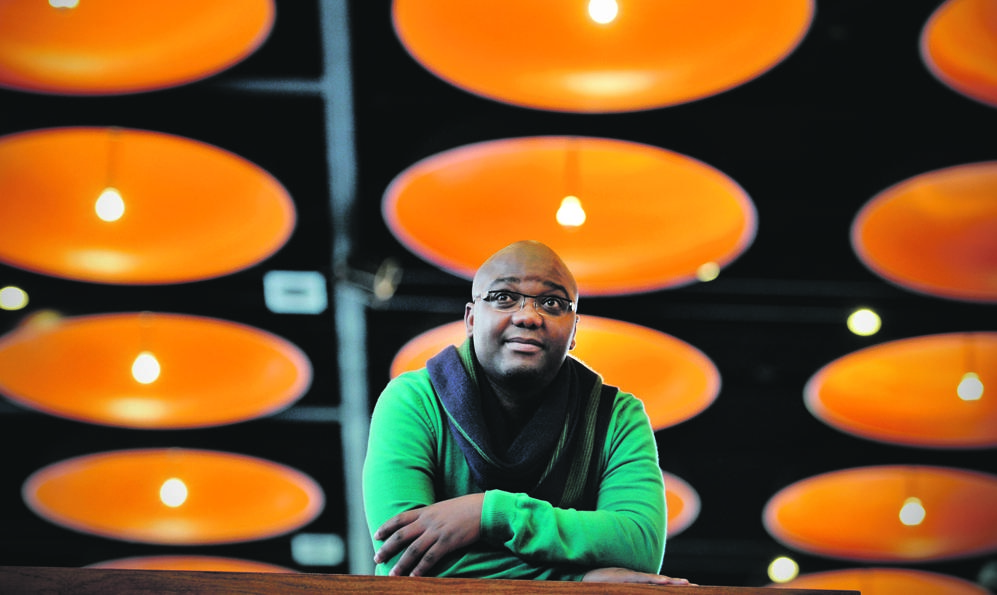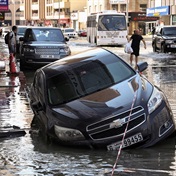
The country’s most relevant literary event is turning three next week and Chimamanda Ngozi Adichie will be there to help blow out the candles. But, as Abantu learns to walk, it’s also building its next level. Charl Blignaut chats with founder and director Thando Mgqolozana.
‘I need to sleep,” says Thando Mgqolozana over the phone, as he did this time last year when I called him up. It’s an understatement, I’m sure, given the logistics of what he’s busy with – realising a whole decolonised black African book and culture festival in Soweto against considerable odds.
The programme for the third edition of Abantu goes online the day we chat – a week before the opening night – and he’s stolen some time to talk through what visitors can expect this year.
“It’s late, there were late confirmations from authors such as Chimamanda,” he says and pauses. “But, you know, with Abantu, people want to come for the whole thing because it’s not just about what’s on the programme.”
I nod silently on the other end of the line. Although Abantu is not created for my privileged white ass, my first memories of time spent at the festival are of laughter. That and meaningful conversations in between panels, screenings, performances and readings; a sense of family and debate.
To be encountered at the Eyethu Lifestyle Centre by day and the Soweto Theatre by night, from Thursday through to Sunday, Abantu is already an institution, in its own way a tangible flowering of what the black-first, woman-first, queer-embracing, self-caring youth voices rising from campuses since 2015 have been talking about.
Free Chimamanda
Mgqolozana, a novelist, Fallist and cultural organiser, is in Joburg to make final arrangements with the Abantu team. Part of what he’s dealing with, well past suppertime, is learning to become his own best bookseller. Abantu Bookstore is arriving this year – a bit premature, but always on the cards. So is Abantu Publishing, while we’re at it.
“It’s going to be very, very tight. My hope is that the bookstore will allow us to use the cash available to pay the bills.”
Once again, Abantu has suffered from unreliable promises of sponsorship.
“We’re looking for long-term funding partnerships. We’ve not been lucky, but we’ve gotten the attention of a few corporates. Maybe the problem is that people want to think of Abantu as controversial. But it isn’t. If black people want to organise themselves, it isn’t controversial,” he says.
The day events at Abantu are, as always, free to the book-reading, film-going, poetry-consuming, music-loving public – and also to their kids, who will be in the care of storyteller and national treasure Gcina Mhlope. Night events cost R20 for the purposes of crowd control.
Which means Adichie is free, too, because she’s up on Friday at 1pm at Eyethu, in conversation with academic fave and award-winning author Pumla Dineo Gqola, PhD. Gqola was, says Mgqolozana, very excited when asked to do the session.
“Pumla’s the first person who came to mind. She’s what we can truly call an expert on literature and she’s a person
of ideas.”
The marquee at the venue can accommodate about 400 seats and there’s talk of screens to broadcast the event to more festivalgoers in other rooms. It’ll be a love crush not to be missed.
Abantu’s next level
I’m interested to know more about the bookstore, one of the busiest spaces at Abantu.
“We always talked about a bookstore. This year, I found myself without one to rely on and so I’m taking up the responsibility. It’s a natural evolution … due to circumstances,” says Mgqolozana.
I ask how many books get sold at Abantu.
“We have no idea how many we sold at the second edition because the designated bookseller did not produce the expected sales report. At the first edition, we sold more than 6 000 books in three days. Last year, it was probably threefold.”
That’s close to 20 000 books bought by the same black readers the white-owned book publishing and bookselling industries said basically didn’t exist a few years ago.
“The interesting thing about the statistics from the first year is that, contrary to popular belief, black people are buying fiction. It outsold everything else. I didn’t expect that.”
Look at how poet Koleka Putuma had a bestseller with her debut Collective Amnesia, I say.
“You’d imagine it would be easy to get poetry into bookstores after that,” responds Mgqolozana, “but Danai Mupotsa and Vangile Gantsho have released incredible books and you don’t see them in the same way you can pick up Koleka. These are the layers and layers of narratives we create about what sells, what people want or don’t want. The Abantu Book Festival has really shut down this idea that black people don’t read and don’t support each other – that’s out of the window now.”
And what is Abantu Publishing all about?
“I have negotiated all three of my titles back,” he explains.
Mgqolozana has been celebrated for his own work – A Man Who is Not a Man (2009), Hear Me Alone (2011) and Unimportance (2014) – which were put out by UKZN Press and Jacana Media.
“It was a mutual agreement to get back the ownership. There was no fallout because they understood where I was coming from and didn’t have any desire to block me. With that being done, I was thinking about what to do with the books now, because I don’t do any festivals to sell my books.”
Mgqolozana famously stood up at the Franschhoek Literary Festival in 2015 and denounced the whiteness of South Africa’s literary scene, declaring a boycott of the circuit.
“So, initially, I’m republishing my own books, but I also want to think about what types of books from other people I want to put out. I’m in no hurry, I haven’t put out a call or anything. The moment is important, but there also has to be deliberate action – taking your time to create things properly so they stand.”
On Saturday at 1pm, A Man Who is Not a Man is relaunching with a 10th anniversary edition. It has a new intro by Gqola, who has been teaching it since it was published.
A lit programme
There’s no overarching theme at Abantu that the invited writers must respond to.
“I feel it would be a burden to the writers, one I have struggled with myself when I was doing book festivals. But you can curate the programme so that there are organic links; themes that intersect,” says Mgqolozana.
Diane Farris, famous for her poem on Sarah Baartman, is on the line-up, as is Zola Maseko’s documentary on Baartman, and, for that matter, Abantu MC Lebo Mashile, the spoken word artist who has just created a stunning stage production around Baartman. It’s these kinds of confluences he’s speaking of.
“There’s a heavy Nigerian presence this year,” adds Mgqolozana as I mentally picture him checking his watch.
“Because the Abantu Book Festival has to have a Pan-African outlook. So Bibi Bakare-Yusuf is delivering the keynote address. It was a deliberate intention to fill the space that has always been occupied by black women at Abantu.”
The inaugural keynote was delivered by Mhlope. Last year, Zimbabwean author Tsitsi Dangarembga had the honour. Bakare-Yusuf is another legend in her own lifetime. The Nigerian publisher, based in Abuja, co-founded Cassava Republic Press in 2006, turning mainstream publishing on its head the same way that Thabiso Mahlape, Zukiswa Wanner and Mgqolozana himself are attempting to do.
Asked what she will be talking about, Mgqolozana is clear.
“The keynote theme is never imposed on the speaker. That’s up to her. She’s a powerful, intelligent person.”
Poetry is also big at the fest.
“This year, the opening performance is the incredible Mxolisi Mtshali, who writes in isiZulu, and is a great storyteller and is hilarious. We refuse to allow poetry to become a fringe activity.”
Mashile was visiting Lagos when she fell in love with Nigerian poets Efe Paul Azino and Wana Udobang, who are also on the bill, as are celebrated novelist Odafe Atogun, and poet and novelist Lola Shoneyin.
Everything at the festival is unmissable – the underappreciated South Africa-born, Canada-based novelist Kagiso Lesego Molope is making a rare appearance; chef with the most Lesego Semenya is launching his first cookbook; Dangarembga is back with a new novel; and groundbreaking children’s book writers Lebohang Masango and Mapule Mohulatsi are starring in the kids’ zone.
“We want the children to come,” says Mgqolozana before he has to ring off. “We don’t want to be doing reading and literacy campaigns forever. Abantu is proving the benefits of being exposed to literature because it’s the best form of self-education on the planet.”
- The Abantu Book Festival is on from Thursday to Sunday in Soweto. Visit abantubookfestival.co.za for all the details. Day events are free and theatre events cost R20. Children are welcome




 Publications
Publications
 Partners
Partners








